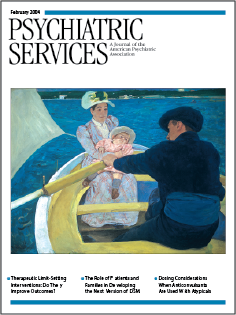Referral to Aftercare and Rehospitalization
To the Editor: The quality of aftercare received by people with severe mental disorders is often poor. Indeed, 40 to 60 percent of psychiatric patients who are discharged from an inpatient facility do not receive aftercare (1). The article in the September issue of Psychiatric Services by Thompson and colleagues (2) shows a positive relationship between referral to aftercare and rehospitalization. On the other hand, the article points out that referral to aftercare services should not be equated with receiving those services and claims an equal access to aftercare.
In 2001 we studied 126 consecutive readmissions to an inpatient unit in Barcelona that occurred within 90 days of the index discharge (3). According to government policy, all patients who are discharged are referred to outpatient aftercare programs. These programs are run by the three mental health centers that serve the community area. A nurse from the mental health centers visits the inpatient unit each week and is given the names of patients whose release from the hospital is pending. Before discharge, the telephone number of the mental health center is given to patients and their families.
Our study showed that the quality of aftercare provided by the three mental health centers was poor. Indeed, among the 126 readmitted patients, 31 (25 percent) did not receive any outpatient care and 46 (37 percent) did not receive psychiatric care during the 21 days before their readmission. Moreover, we found significant variability in the aftercare provided by each of the mental health centers (χ2=15.57, df=4, p=.004). Of the 38 patients referred to the first mental health center, 16 (42 percent) did not receive any outpatient care. Eight of the 44 patients referred to the second center (18 percent) and seven of the 44 cases referred to the third mental health center (16 percent) received no aftercare. Five of the patients referred to the first mental health center (13 percent) did not receive psychiatric care during the 21 days before their readmission. Corresponding figures for the second and third centers were 21 patients (48 percent) and 20 patients (46 percent), respectively. In our view, these findings warrant further investigation, especially in regard to aspects of the mental health system that are barriers to and facilitators of care.
The authors are affiliated with the mental health department of the Doctor Emili Mira Hospital Center in Barcelona, Spain.
1. Klinkenberg WD, Calsyn RJ: Predictors of receipt of aftercare and recidivism among persons with severe mental illness: a review. Psychiatric Services 47:487–496,1996Link, Google Scholar
2. Thompson EE, Neighbors HW, Munday CM, et al: Length of stay, referral to aftercare, and psychiatric rehospitalization among psychiatric inpatients. Psychiatric Services 54:1271–1276, 2003Link, Google Scholar
3. Lana F: Short-stay psychiatric hospitalization, today: difficulties after short-term psychiatric hospitalization. Presented at the World Psychiatric Association International Congress, Madrid, Sept 30-Oct 4, 2001Google Scholar



